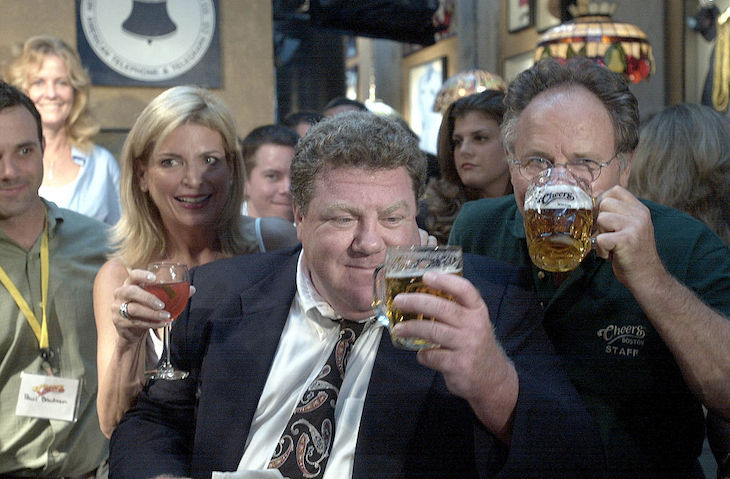One of the most popular sitcoms of the 1980s, Cheers, is set to return to our television screens. The show is set for a revamp, except now it will be uprooted from Boston and transposed to a pub in Britain. This is obviously a terrible idea, for a few logistical reasons – and for one large cultural reason.
Comedy wasn’t a slave to politics back then
The main scriptwriter for the UK remake is reported by the Daily Telegraph to be our own Simon Nye, the brains behind Men Behaving Badly, while it’s being developed by Big Talk Studios. Its chief executive Kenton Allen explains that it will be no mere repeat performance of the original:
‘The attitudes of Cheers in the 80s are very different to the attitudes of today, so there’s a massive amount of work to be done around taking inspiration from the original characters but creating something fresh.’
That statement alone should have alarm bells ringing loudly for aficionados of the original series.
The makers face many obstacles even before the writers put pen to paper or cameras start to role. For one, attempts to transport comedy shows from one side of the Atlantic to the other have an awful track record. Men Behaving Badly was one such example, with its US version running for two series between 1996 and 1997. American versions of Dad’s Army, The Inbetweeners, and The Thick of It fared even worse. Most famously there were several failed attempts to transpose Fawlty Towers. British attempts to remake US sitcoms The Golden Girls and Married…With Children also foundered. The only comedy ever to have successfully traversed the cultural divide between our two countries has been The Office.
The sitcom as a genre is decidedly passé today, ever since its heyday of the 1990s. That was the decade that witnessed the tail end of Cheers, and the dawn of Frasier, Friends and Seinfeld. These remain classics. The only sitcom remotely of note to have emerged from the USA since has been The Big Bang Theory. Back home, the turn of the millennium similarly saw Father Ted, I’m Alan Partridge and The Office. Again, it’s been thin gruel ever since. The only domestic sitcom of recent years to have made an impact has been Not Going Out.
In an age when audiences prefer cheap, quick laughs from YouTube and TikTok clips, commissioning editors consider sitcoms too expensive and too long-term a gamble. They’re also too politically risky. One of the reasons the US version of Men Behaving Badly failed was that cable audiences found its bawdy, gross-out humour inappropriate. Sitcoms inevitably touch upon serious issues of the day, and amidst today’s mood of cancellation and self-censorship, to approach serious issues is a venture fraught with peril. How confident would nervous producers feel now in making a show featuring David Brent, with all his awful, unacceptable views?
And what a time to decide on a comedy set in a British pub. As Kenton Allen himself concedes: ‘I might be insane. The British pub is an endangered species, so there’s an answer for the “Why now?” about it.’ Why now indeed. What with this institution already having been hit by the smoking ban, a rise in abstemiousness, a culture averse to the lunchtime or after-work pint, the British pub is now threatened by our government with the threat of reduced opening hours, two-thirds-sized pint glasses and a reputed hike in alcohol duty. Making the British boozer a funny place to be will take some leaps of the imagination.
Yet what of the eventuality of a re-vamped Cheers for the mid-21st century? Contemporary television is particularly susceptible to the whims and diktats of identity politics, as Dr Who audiences or those who follow BBC drama know all-too-well. Anyone who still catches early morning re-runs of Cheers on Channel 4 can’t help agreeing that it is very 80s. Yet that’s its appeal. That’s why Channel 4 still show it and why people still watch it. Comedy wasn’t a slave to politics back then.
Its original integrity can only be but compromised by the demands of today. The first ‘problematic’ issue will be its all-white cast. This is seen as even unacceptable today in historic dramas set in periods when everyone actually was white. There were also no regular gay character in Cheers, let alone those from the trans community. Its lead protagonist Sam Malone, so obviously the epitome of chauvinism and ‘toxic masculinity’, would have to be emasculated or done away with. Its principle women would no longer be the vain snob Diane Chambers or the avaricious neurotic Rebecca Howe, but a mandatory ‘strong female character’.
As as for the dipsomaniac, work-shy Norm Peterson, whose much-maligned wife we never even got to see? He would be history. So too might be all our fond memories of this charming show.







Comments